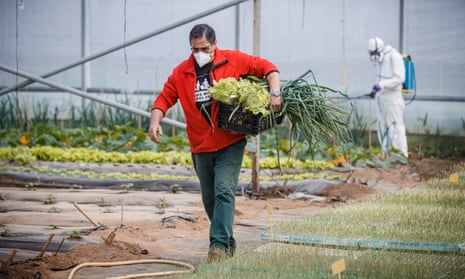At first sight, the 23 people who live together next to a petrol station in the Spanish city of Salamanca have little to bind them together.
Some are migrants who have braved sea crossings in small boats or the razor-wire fences of camps in Ceuta and Melilla in Morocco; some have struggled with drug or alcohol addiction; some have been in prison, and some have ended up on the streets.
The common denominator in all their lives is Emiliano de Tapia, a priest whose parish is located in the Buenos Aires neighbourhood of Salamanca, one of the biggest drug hubs in northwestern Spain.
It was here, 25 years ago, that the priest – no one calls him Fr Emiliano – set up his project. “We wanted to create a place that would welcome people who had been excluded from society, and whom society wanted to keep out,” he says. “The idea was to get people under one roof so they could share food and also the worries that affect us all.”
For years, the collective has been working the land in abandoned rural areas, growing food for themselves and for others. The peppers, onions, tomatoes, potatoes, carrots and courgettes they produce across eight hectares (19 acres) of land in the countryside between Salamanca and Zamora are their own small contribution to the push against rural depopulation.
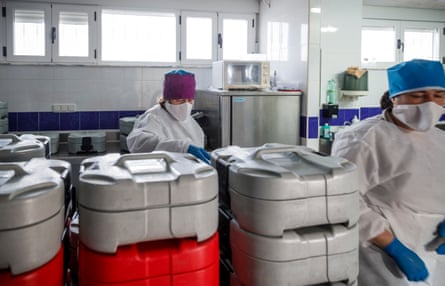
Local women use what is grown to make meals that are delivered to 50 older people in 17 villages so they can continue to be independent and stay in the homes they have lived in for decades.
Their kindness assumed a new urgency when the coronavirus hit Spain, prompting the declaration of a state of emergency and one of the strictest lockdowns in Europe.
Were it not for the meals-on-wheels service, many of the people they feed would have found themselves rushed into care homes for the duration of the health emergency by their concerned families. The problem in Spain, as elsewhere, is that care facilities have been hard-hit, with high numbers of Covid-19 casualties.
Since the virus arrived in Spain, the meals, delivered by a van that covers 200km a day, have been left on the doorsteps or handed through windows in gloved hands. The driver wears a mask and takes all the precautions necessary when bringing food to the villagers, many of whom are well into their 90s.
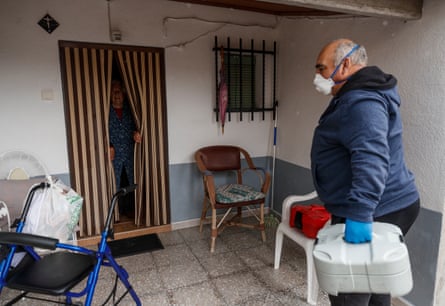
The priest’s collective are delighted to be able to help.
Alou, who left Mali 18 years ago to come to Europe to find work to support his family, is once again using the farming skills of his youth. “It’s only a drop in the ocean when it comes to social inequality during the pandemic, but it makes me happy,” he says.
He was 21 when he left his home country and it took him nine years – and journeys through several African countries – to reach Morocco, where he was tortured as he waited to scale the fence that separates the country from the Spanish enclave of Melilla. Five years ago, after passing through numerous reception centres, he met Emiliano.
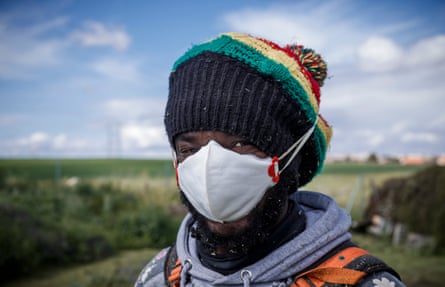
“When I left Mali, I thought I’d see my family again soon,” says Alou. “But I haven’t seen them since I left. All I wanted to do was get to Europe to earn money to send back to them but instead, I’ve been through a lot and have been attacked by the people mafias that steal all your money when you try to cross the border.”
Like Alou and other members of the group, Mario Augusto Godines has found an unexpected sense of peace – and purpose – in Salamanca.
After a childhood spent on the streets of San José in his native Costa Rica, he came to Spain to free himself from drugs and other painful aspects of his past. It is a decision he has never regretted.
“When I watch TV and see all the images of unburied bodies, I think of my relatives who aren’t around any more,” says Godines. “It makes me very sad – but it also makes me very grateful that I can do something to help the old people we look after. It seems a decent way to repay all the support that helped get me finally off the margins when I was 44 years old.”
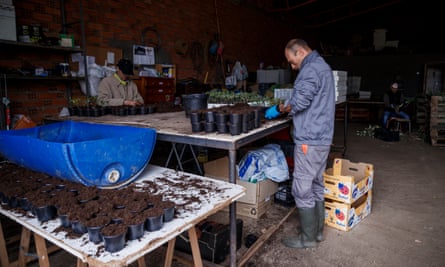
“We decided to make a go of it together,” says the priest. “After being helped themselves, these people are going on to help older people.” And that, he adds, “is what transforming lives is all about.”
Jesús, a 66-year-old former bank robber who is the oldest member of the collective, is proof that it is never too late for transformation.
Having spent nearly half his life in prison, he is more accustomed to confinement than most. But he is also determined to keep working, even if it means he has to step into a hazmat suit to protect his vulnerable health as he heads out to the fields.
“When I met Emiliano 12 years ago, I’d just got out of prison,” says Jesús. “I had nothing and no one and my plan was to go back to what I’d done my whole life, which was holding up banks with a sawn-off shotgun or a pistol.”
All this, he says, “is the true miracle of my life. I can be useful to society now and for me that’s like being in Eden”.
